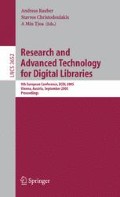Abstract
Most user focused data mining techniques involve purchase pattern analysis, targeted at strictly-formatted database-like transaction records. Most personalization systems employ explicitly provided user preferences rather than implicit rating data obtained automatically by collecting users’ interactions. In this paper, we show that in complex information systems such as digital libraries, implicit rating data can help to characterize users’ research and learning interests, and can be used to cluster users into meaningful groups. Thus, in our personalized recommender system based on collaborative filtering, we employ a user tracking system and a user modeling technique to capture and store users’ implicit ratings. Also, we describe the effects (on community finding) of using four different types of implicit rating data.
Access this chapter
Tax calculation will be finalised at checkout
Purchases are for personal use only
Preview
Unable to display preview. Download preview PDF.
References
Kumar, R., Novak, J., Raghavan, P., Tomkins, A.: Structure and Evolution of Blogspace. Communications of the ACM 47(12), 35–39 (2004)
Cass, R.: Sunstein: Democracy and Filtering. Communications of the ACM 47(12), 57–59 (2004)
Malone, T.W., Grant, K.R., Turbak, F.A., Brobst, S.A., Cohen, M.D.: Intelligent information sharing systems. Communications of the ACM 30(5), 390–402 (1987)
Nichols, D.M., Pemberton, D., Dalhoumi, S., Larouk, O., Belisle, C., Twidale, M.B.: DEBORA: Developing an Interface to Support Collaboration in a Digital Library. In: Borbinha, J.L., Baker, T. (eds.) ECDL 2000. LNCS, vol. 1923, pp. 239–248. Springer, Heidelberg (2000)
Yu, K., Schwaighofer, A., Tresp, V., Xu, X., Kriegel, H.-P.: Probabilistic Memory-based Collaborative Filtering. IEEE Transactions on Knowledge and Data Engineering 16(1), 56–69 (2004)
Nichols, D.M.: Implicit Rating and Filtering. In: Proceedings of 5th DELOS Workshop on Filtering and Collaborative Filtering, Budapest, Hungary, November 1997, pp. 31–36 (1997)
Konstan, J.A., Miller, B.N., Maltz, D., Herlocker, J.L., Gordon, L.R., Riedl, J.: GroupLens: Applying Collaborative Filtering to Usenet News. Communications of the ACM 40(3), 77–87 (1997)
Kim, S., Fox, E.A.: Interest-based User Grouping Model for Collaborative Filtering in Digital Libraries. In: Chen, Z., Chen, H., Miao, Q., Fu, Y., Fox, E., Lim, E.-p. (eds.) ICADL 2004. LNCS, vol. 3334, pp. 533–542. Springer, Heidelberg (2004)
Gonçalves, M.A., Luo, M., Shen, R., Farooq, M., Fox, E.A.: An XML Log Standard and Tools for Digital Library Logging Analysis. In: Proceedings of Sixth European Conference on Research and Advanced Technology for Digital Libraries, Rome, Italy, September, 2002, pp. 16–18 (2002)
Ahuja, K., Murthy, U., Vasile, S. In: Virginia Tech report (2004), available at, http://collab.dlib.vt.edu/runwiki/wiki.pl?MmProjectUserMod
Carrot2 Project, A Research Framework for experimenting with automated querying of various data sources, processing search results and visualization (2005), available at, http: www.cs.put.poznan/pl/dweiss/carrot/
Osiński, S., Weiss, D.: Conceptual Clustering Using Lingo Algorithm: Evaluation on Open Directory Project Data. In: Advances in Soft Computing, Intelligent Information Processing and Web Mining, Proceedings of the International IIS: IIPWM 2004 Conference, Zakopane Poland, pp. 369–378 (2004)
Ceglar, A., Roddick, J., Calder, P.: Guiding Knowledge Discovery Through Interactive Data Mining. In: Managing Data Mining Technologies in Organizations: Techniques and Applications, pp. 45–87. Idea Group Publishing, USA (2003)
CITIDEL (2005), Available at, http://www.citidel.org/
Ott, R.L., Longnecker, M.: An Introduction to Statistical Methods and Data Analysis. 5th edn. Wadsworth Group (2001)
Perugini, S., McDevitt, K., Richardson, R., Perez-Quiñones, M., Shen, R., Ramakrishnan, N., Williams, C., Fox, E.A.: In: Proceedings of the Fourth ACM/IEEE Joint Conference on Digital Libraries (JCDL 2004), Tucson Arizona, June 2004, pp. 315–324 (2004)
Author information
Authors and Affiliations
Editor information
Editors and Affiliations
Rights and permissions
Copyright information
© 2005 Springer-Verlag Berlin Heidelberg
About this paper
Cite this paper
Kim, S., Murthy, U., Ahuja, K., Vasile, S., Fox, E.A. (2005). Effectiveness of Implicit Rating Data on Characterizing Users in Complex Information Systems. In: Rauber, A., Christodoulakis, S., Tjoa, A.M. (eds) Research and Advanced Technology for Digital Libraries. ECDL 2005. Lecture Notes in Computer Science, vol 3652. Springer, Berlin, Heidelberg. https://doi.org/10.1007/11551362_17
Download citation
DOI: https://doi.org/10.1007/11551362_17
Publisher Name: Springer, Berlin, Heidelberg
Print ISBN: 978-3-540-28767-4
Online ISBN: 978-3-540-31931-3
eBook Packages: Computer ScienceComputer Science (R0)

